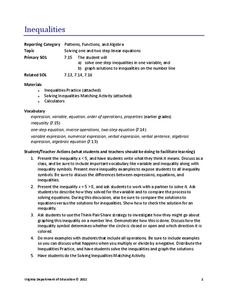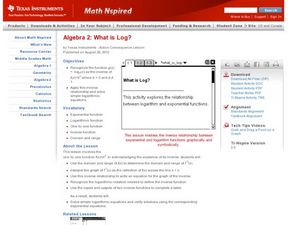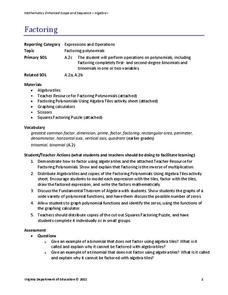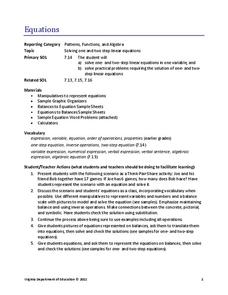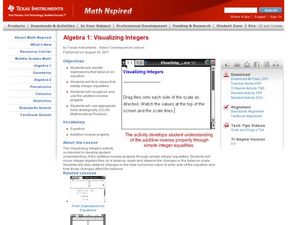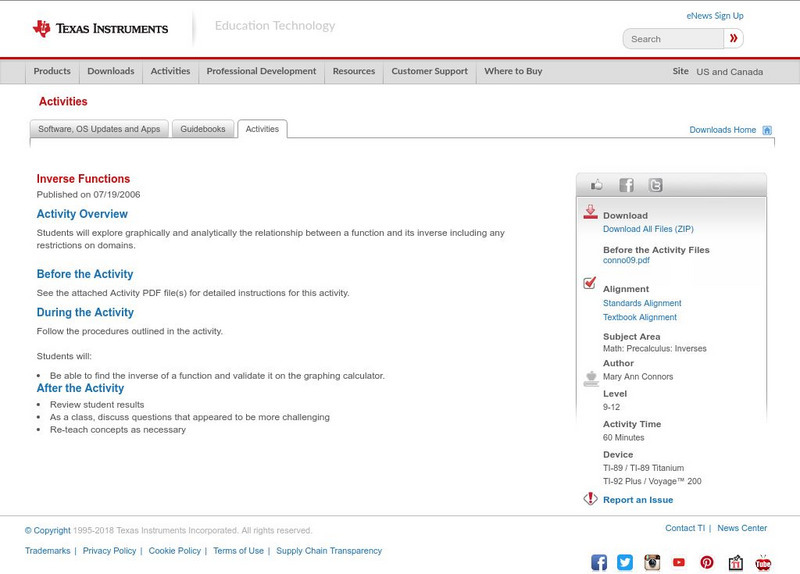Curated OER
Getting Out of Line
Students explore basic connections between graphs, tables, and symbolic representations for lines, parabolas, inverse models, and exponential models. One of the primary goals of this lesson is to help students begin to recognize patterns...
Curated OER
Trigonometry and the Calculator
In this geometry worksheet, 10th graders use a graphing calculator to evaluate trigonometric functions and their inverses. The four page worksheet contains explanation, examples, and twenty questions. Answers are not included.
Curated OER
Dynagraphs
Students collect and graph their data. In this precalculus lesson, students identify the input and out of a function. They find the domain and range and the inverse of a function.
EngageNY
Complex Numbers and Transformations
Your learners combine their knowledge of real and imaginary numbers and matrices in an activity containing thirty lessons, two assessments (mid-module and end module), and their corresponding rubrics. Centered on complex numbers and...
Virginia Department of Education
Inequalities
Not all resources are created equal — and your class benefits! Scholars learn how to solve one-step inequalities using inverse operations. They complete an activity matching inequalities to their solutions.
Curated OER
Penny Moves
Pupils explore math functions by completing a worksheet in class. In this spatial movement lesson plan, students utilize a four square grid and a penny to practice moving the coin horizontally, vertically and diagonally as instructed....
Curated OER
Finding Fractional Parts Using an Area Model
Students explore math functions by completing a problem solving worksheet in class. In this division lesson, students utilize visual aides such as marshmallows and candy to visualize the act of division. Students complete a division...
Curated OER
Investigation - Who is Right?
Third graders explore mathematics by solving problems in groups. In this math functions lesson, 3rd graders demonstrate their understanding of addition and subtraction by completing two digit math problems. Students define a list of math...
Curated OER
What is Log?
Young mathematicians differentiate between logs and natural logs in this algebra instructional activity. They solve functions and logarithmic functions. Learners also graph and rewrite the exponential and log functions.
Curated OER
Activity One Teacher Page: Vehicles In Motion
Students identify variables that affect the system, and specify which variables are independent and which are dependent.
Curated OER
Radical Transformations
Students transform the square root function graphically. In this transforming the square root function graphically lesson, students use their Ti-Nspire to change the a, b, and c values of th square root graph. Students transform the...
Curated OER
Skate Party
Learners use the Frayer model during problem solving. In this problem solving instructional activity, they examine multiple methods of data collection to solve real world problems. Resources are provided.
Curated OER
Algebra II: Crickets-Nature's Thermometer
Students translate functional relationships into equations to answer questions. Students answer questions using different representations of the relationships: function rules, graphs of the function, tables of values, and equations and...
Alabama Learning Exchange
Technology for Displaying Trigonometric Graph Behavior: Sine and Cosine
Young scholars explore the concept of sine and cosine. In this sine and cosine lesson, students work in groups to graph sine and cosine functions. Young scholars examine how coefficients in various parts of each parent function shift...
Curated OER
Oodles of Poodles
Students solve equations by graphing. For this algebra lesson, students differentiate between functions and relations. They use the TI to graph their equation and analyze the graph.
Mathematics Vision Project
Similarity and Right Triangle Trigonometry
Starting with similar triangles and dilation factors, this unit quickly and thoroughly progresses into the world of right triangle features and trigonometric relationships. Presented in easy-to-attack modules with copious application...
Curated OER
Investigating Correlation
High schoolers investigate different types of correlation in this statistics lesson. They identify positive, negative and no correlation as it relates to their data. They then find the line of best fit for the plotted data.
02 x 02 Worksheets
Factoring
Factor in this resource when teaching how to factor polynomials. Scholars use algebra tiles to factor linear and quadratic expressions. They practice their skill by working on example problems from a worksheet.
Curated OER
Power, Work and the Waterwheel
Learners use a two-liter bottle, dowel rod and index cards to design and construct a water wheel. They then calculate the power created and measure the work done by the water wheel in Watts and Joules.
Curated OER
Computing Indefinite Integrals
Provide your learners with a framework for introducing indefinite integrals. It takes into account a learner’s prior knowledge of slope fields and definite integrals and uses the notion of an antiderivative to give them an intuitive...
Virginia Department of Education
Equations
Science equipment can be handy for math class, too. Scholars learn to solve one- and two-step linear equations by using the concept of a balance. They solve real-world problems in a variety of contexts by writing and solving linear...
Curated OER
Visualizing Integers
Students create visuals on the TI Calculator to solve problems. In this algebra lesson, students perform basic operations with integers. They add, subtract, multiply and divide.
Curated OER
Speaking Skills - Asking Questions
Students improve speaking confidence when using difficult question forms. This lesson focuses on helping students explain how to engage in this kind of social conversation. A worksheet imbedded in this plan provides practice.
Texas Instruments
Texas Instruments: Inverse Functions
Review inverse functions with your students using this TI-83 activity. Students will find inverses of given functions, determine whether the inverse is a function, graph both, and check for symmetry through the line y=x. The lesson...






